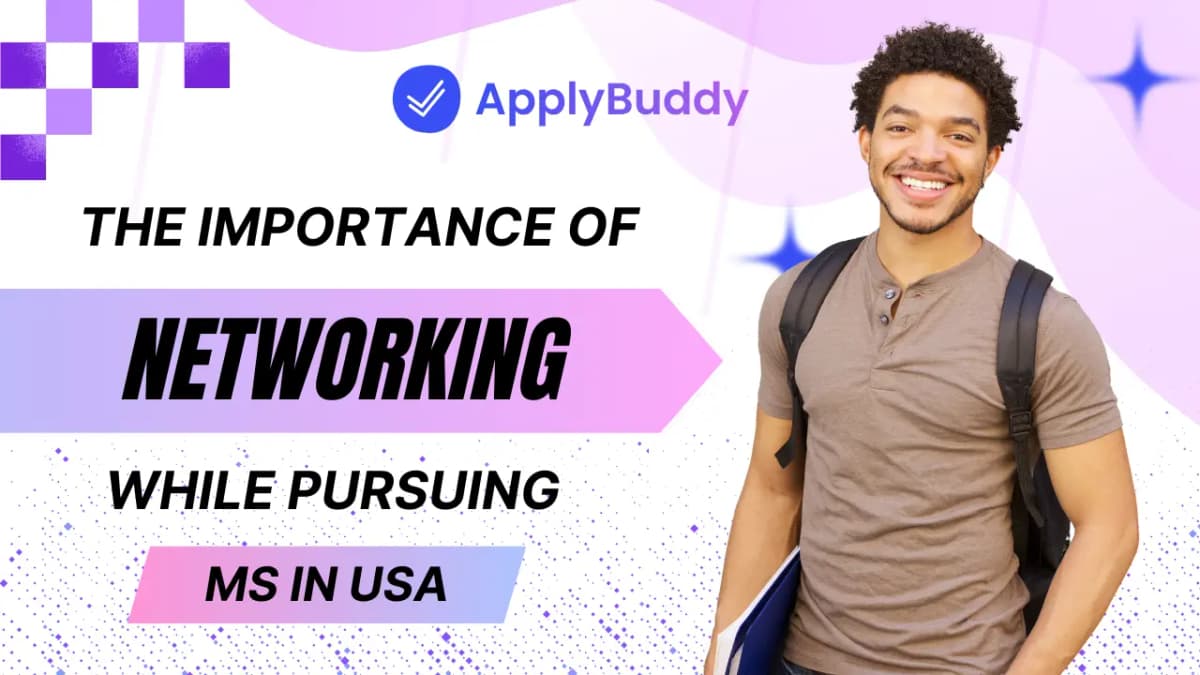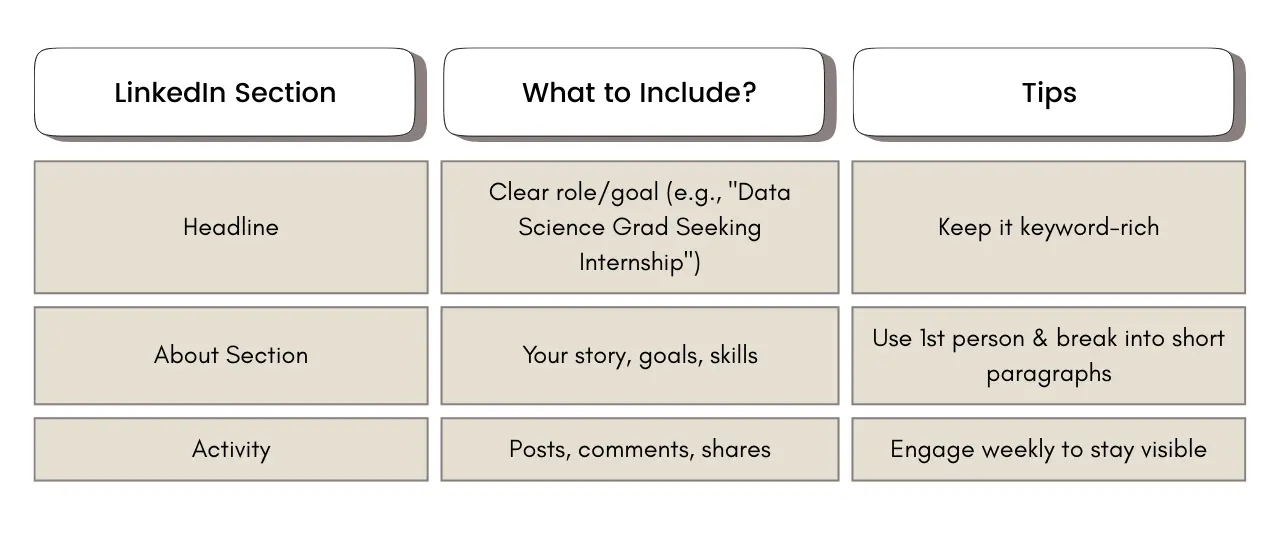The Importance of Networking While Pursuing MS in the USA
Discover why networking is key to landing jobs, internships, and building a strong support system while pursuing your MS in the USA.
April 22, 2025

Check your personalized list of shortlisted universities now!
Easily track application deadlines, requirements, and acceptance chances for your shortlisted universities, get personalized recommendations to refine your list further.
When you arrive in the U.S. for your master's, you quickly realize there's more to success than just attending classes and scoring well on exams. One of the most overlooked—but most powerful—tools you have is networking.
In the U.S., a large number of job opportunities never even get posted online—they're filled through referrals and personal connections. Whether you're looking for internships, research positions, or full-time jobs, who you know can often make a bigger difference than what you know.
And the good news? You don't need to be a natural extrovert or have a massive following. Networking is simply about building meaningful, two-way relationships that help you grow both professionally and personally.
Let's explore how different types of networking—from professors and peers to alumni and recruiters—can help you make the most of your time in the U.S.
1. Why Networking is a Game-Changer in the U.S.
Unlike in many other countries where job applications rely heavily on qualifications and formal processes, the U.S. job market thrives on connections. A large number of job and internship opportunities are never even posted online—they're filled through referrals or internal recommendations.
Having a strong network can:
-
Open doors to internships, research roles, part-time jobs, and even full-time positions.
-
Help you find mentors who understand the U.S. work culture and can guide you.
-
Build your confidence as you navigate a new academic and professional environment.
Whether you're trying to land your first internship or break into a competitive field like data science or AI, who you know can often be just as important as what you know.
2. Academic Networking: More Than Just Grades
Professors, teaching assistants, and department advisors aren't just there to grade your papers—they can be powerful allies in your academic and professional growth.
By building genuine relationships with them, you can:
-
Get access to research assistant (RA) positions, which are not only paid but also great resume boosters.
-
Find a mentor for your thesis or capstone project.
-
Receive strong letters of recommendation for internships, scholarships, or even PhD applications.
-
Stay in the loop about departmental events, research symposiums, or guest lectures that could lead to further opportunities.
Open Table showcasing who to network with, their benefits and examplary actions to network.webp

Start by showing interest in their work, asking thoughtful questions, or dropping by during office hours—it goes a long way.
3. Peer Networking: Your First Circle of Influence
Never underestimate the power of the people sitting next to you in class.
Your classmates today might become:
-
Your future colleagues in top tech firms.
-
Your co-founders if you start a business.
-
Your go-to referral contacts for job opportunities.
The friendships and connections you build through group projects, student organizations, hackathons, or even casual study sessions often grow into long-term professional networks. Some of the most exciting startup stories or successful careers started with simple conversations between classmates.
So be open, collaborate, attend events, and put yourself out there—networking doesn't have to be intimidating, it can start with a simple coffee chat or shared assignment.
Open Students networking with their peers in a Career Fair and Event.webp

4. Internships and Career Fairs: Making the Right Impressions
Career fairs and internship expos are more than just places to hand out resumes—they're a chance to connect face-to-face with recruiters, company reps, and even alumni working at your dream companies.
Here's the truth: The impression you leave in a 2-minute conversation can matter more than anything on your resume.
Some tips to stand out:
-
Prepare a clear and confident elevator pitch about who you are and what you're looking for.
-
Follow up with recruiters on LinkedIn (within 24 hours if possible!) and thank them for their time.
-
Keep it genuine. Ask thoughtful questions that show interest in the company, not just the job.
These simple steps can help you stay on recruiters' radars and potentially lead to interviews.
5. LinkedIn & Online Presence: Your Digital Handshake
Your LinkedIn profile is often your first impression before anyone meets you in person. A strong online presence shows you're serious, engaged, and proactive.
Here's how to make the most of it:
-
Keep your profile updated with projects, achievements, and certifications.
-
When sending connection requests, add a short note explaining why you're reaching out—this builds better relationships.
-
Don't be afraid to post! Share your learnings, experiences, or opinions. Even a quick post about what you learned at a hackathon or class project can spark conversations and visibility.
Open Table showcasing the how to network using LinkedIn platform.webp

6. Alumni Networks: An Untapped Goldmine
Your university's alumni community is one of the most valuable yet underutilized resources.
Why? Because alumni have been in your shoes. They've navigated the same challenges—academics, internships, job hunts, visa questions—and are often more than willing to help.
Here's what they can offer:
-
Insider insights on roles, team culture, and career paths.
-
Referral opportunities, especially at companies where internal referrals matter.
-
Advice on adapting to workplace culture and understanding job market expectations.
A polite, thoughtful message on LinkedIn asking for a quick call can go a long way. Just be respectful of their time, ask specific questions, and always thank them for helping.
Open Students netwroking with their peers at a Tech Meetup.webp

7. Professional Groups & Meetups: Go Beyond Campus
Networking isn't limited to campus events. Many valuable connections are made off-campus—at meetups, hackathons, or conferences where professionals from your industry hang out.
Platforms like:
-
Industry groups like IEEE, ACM, or Women Who Code
...are full of events where you can meet people working in companies or roles you're aiming for.
Even attending one or two events a month can help you build meaningful industry connections, learn about new trends, and maybe even discover job opportunities you didn't know existed.
8. Networking Etiquette: Building Relationships, Not Just Collecting Contacts
Networking is not just about how many LinkedIn connections you have—it's about the quality of the relationships you build.
Start by thinking: How can I offer value first?
That might mean:
-
Sharing a useful article.
-
Congratulating someone on a recent achievement.
-
Asking thoughtful questions that show you're genuinely interested.
After meeting someone at an event or during a chat, always follow up—a short thank-you message can leave a lasting impression. Keep the conversation going occasionally, not just when you need help.
People are more likely to support those they trust and like, so focus on building real connections, not just "networking."
9. How Networking Helps With Visa & Immigration Guidance
One of the biggest sources of stress for international students? Navigating the visa system.
Luckily, you're not alone. Networking with seniors, alumni, or even professionals on LinkedIn can help you:
-
Understand how others approached OPT, CPT, and H-1B timelines.
-
Learn how specific companies handle sponsorship.
-
Get practical advice on job search timelines that align with visa deadlines.
This kind of information isn't always easy to find online—but it often lives in someone's personal experience. Talking to people who've been there can give you a much clearer path forward.
10. Personal Growth & Confidence
Networking doesn't just open doors professionally—it helps you grow as a person.
The first few conversations might feel awkward, especially if you're not used to small talk or professional communication styles in the U.S. But over time, you'll notice:
-
You speak more clearly and confidently.
-
You get better at telling your story and highlighting your strengths.
-
You start feeling like you belong in rooms that once felt intimidating.
For international students, especially, networking can help break through language and cultural barriers. It's a safe, supportive way to practice communication skills, expand your worldview, and build self-confidence.
Networking might feel intimidating at first, but it doesn't have to be. It's not about handing out business cards or having a perfect elevator pitch—it's about genuine curiosity, mutual support, and being open to learning from others.
As a student in the U.S., every interaction—whether it's with a professor, a classmate, or a professional at an event—is a chance to grow your network and your confidence. The relationships you build today can lead to mentorships, referrals, lifelong friendships, and even your first job.
So take that first step. Attend a meetup, reach out to alumni, or just ask a classmate about their internship. You never know where a simple conversation might lead.
FAQs
1. I'm introverted and not great at small talk. Can I still network effectively?
Yes! Networking isn't just for extroverts. It's more about building real relationships than talking to everyone in the room. Start by connecting one-on-one with classmates or professors, and prepare a few go-to conversation starters for events. Being a good listener is a huge networking strength.
2. What should I say when reaching out to alumni on LinkedIn?
Keep it short and respectful. Mention your university, course, and reason for reaching out. Ask specific questions (like how they landed their internship/job or how they handled CPT/OPT timelines). Most alumni appreciate students who do a bit of homework before messaging.
3. How do I follow up after meeting someone at a conference or meetup?
Send a LinkedIn request within 24–48 hours. Add a short personalized note like, "Hi [Name], I enjoyed our chat about [topic] at [event]. Would love to stay connected!" A quick thank-you message or follow-up question keeps the relationship going.
4. Can networking really help with visa and job search challenges?
Yes, a lot. Many seniors and alumni have firsthand experience navigating OPT, CPT, and H-1B issues. They often share timelines, employer experiences, and tips that you won't easily find online. A simple conversation can save you hours of confusion.
Stay Ahead with Exclusive Insights!
Subscribe to our newsletter for the latest updates, career opportunities, and expert tips delivered straight to your inbox. Join our community and never miss out!


